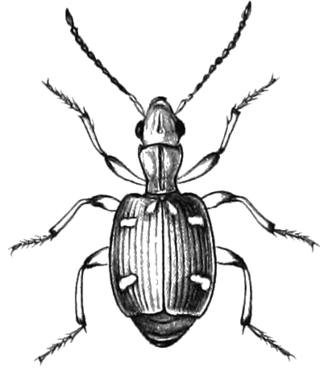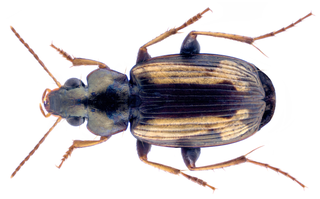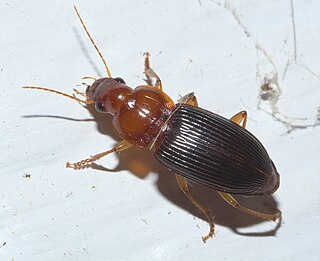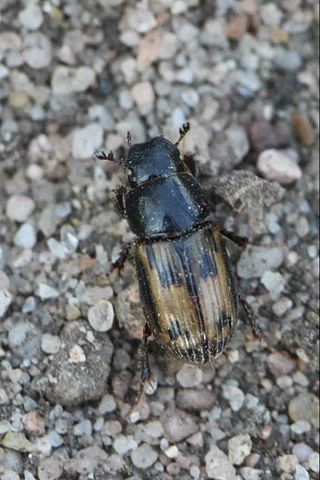
The Trichiini are a tribe of the scarab beetle family (Scarabaeidae), though historically they were often classified as a subfamily, Trichiinae. The conspicuous bee beetles (Trichius) are probably the best-known genus in Europe.

Flower chafers are a group of scarab beetles, comprising the subfamily Cetoniinae. Many species are diurnal and visit flowers for pollen and nectar, or to browse on the petals. Some species also feed on fruit. The group is also called fruit and flower chafers, flower beetles and flower scarabs. There are around 4,000 species, many of them still undescribed.

Brachinus is a genus of ground beetle native to the Nearctic, Palearctic, the Near East and North Africa. Beetles in this genus are commonly referred to as bombardier beetles. The genus contains the following species:

Lebia is a genus of predatory ground beetles. Common names include colorful foliage ground beetles and flat ground beetles. They are found worldwide and there over 700 species in 17 subgenera.

Cypholoba is a genus of beetles in the family Carabidae, containing the following species:

Macrocheilus is a genus of beetles in the family Carabidae, containing the following species:

Mastax is a genus of beetles in the family Carabidae, containing the following 52 species:

Dromica is a genus of beetles in the family Cicindelidae, containing the following species:

Amblystomus is a genus of beetles in the family Carabidae, containing the following species:

Tetragonoderus is a genus of beetles in the family Carabidae, containing the following species:

Graphipterus is a genus of beetles in the family Carabidae, containing the following 139 species:

Mylabris is a genus of beetles in the family Meloidae. It is endemic to the Palearctic realm. The species-rich genus Hycleus was historically confused with Mylabris. It is superficially similar, but is centered on the Afrotropics.
Euplynes is a genus of beetles in the family Carabidae, containing the following species:

Abacetus is a genus of beetles in the family Carabidae, distributed across Africa, Asia and Australia, with a single European species. It contains the following species:

Xystrocera is a genus of beetles in the subfamily Cerambycinae and the tribe Xystrocerini, with a relatively world-wide distribution.

Epicauta is a genus of beetles in the blister beetle family, Meloidae. The genus was first scientifically described in 1834 by Pierre François Marie Auguste Dejean. Epicauta is distributed nearly worldwide, with species native to all continents except Australia and Antarctica. Surveys have found the genus to be particularly diverse in northern Arizona in the United States. Few species occur in the Arctic, with none farther north than the southern Northwest Territory of Canada.
Tetragonoderus chalceus is a species of beetle in the family Carabidae. It was described by Chaudoir in 1876. It is endemic to Argentina.
Dyschirius dispar is a species of ground beetle in the subfamily Scaritinae. It was described by Peringuey in 1896.

Harpalini is a tribe of a diverse group of ground beetles belonging to the subfamily Harpalinae within the broader family Carabidae. The tribe contains more than 1,900 species.

Aphodiini is a tribe of aphodiine dung beetles in the family Scarabaeidae. There are more than 250 genera and 2,200 described species in Aphodiini.
















